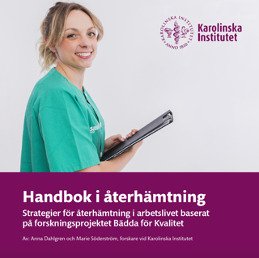
The research group’s activities in brief
Our research is based on a systems approach, which means that we study various aspects of working hours, recovery and safety at both individual and organizational level. The goal is to contribute with knowledge that can be used in the systematic work for a sustainable working life, where fatigue (or lack of recovery) is seen as a risk to health and safety.
Working hours
In addition to workload and stress, working hours are an important prerequisite for recovery. Different schedule models and different types of shifts or shift combinations can affect employees´ recovery opportunities with implications for health and safety. The working time research has resulted in a series of advice on various aspects of scheduling (more info via links below, in Swedish). The focus of some of our research projects is on factors promoting sustainability when having a participatory working time model and how quick returns (<11 hours between shifts) affect health, stress and cognition.
Things to consider when scheduling
More information about shift work
Within the project Bädda för Kvalitet (see below), a tool was developed where nurses could evaluate their working time schedules. Try entering a working time schedule into the working time evaluation tool ArturNurse and get an evaluation of fatigue risks.

Recovery
Recovery is a key factor in coping with a period of high stress and strain. Paradoxically, it is during stressful periods, when recovery is needed the most, that it is often the difficult to achieve. In our research, we take a broad approach and look at several aspects of recovery, such as sleep, rest, breaks, and activities that provide energy. Recovery in a working life context is about enabling recovery both during work and between work shifts. A focus of the research group's project is to investigate how recovery can be strengthened both at the individual level and at the organizational level in relation to work-related stress and irregular working hours.
Parts of the material from our applied research projects are summarized in a handbook in recovery that is available to download for free. Contact us if you want it as a printed folder.
Link to the handbook for recovery.
Listen to the audio file of practicing mindfulness through "body scanning".
More information about recovery can be found at Sunt Arbetsliv
Recovery - how can operational managers/HR experts create good conditions?
Recovery - how can I, as operations manager/HR expert, support employees?
Safety
Safety is related to working hours and recovery. Working night or early morning shifts is associated with increased risks of making errors and mistakes at work. Lack of recovery and fatigue affect cognitive ability and emotion regulation, which can affect work performance and teamwork. In the longer term, lack of recovery, stressful working hours and fatigue risk leading to ill-health, sick leave and increased staff turnover, which is negative from a patient safety perspective. Seeing fatigue as a risk factor in relation to working hours and workload can be valuable both from a work environment perspective and a patient safety perspective.
In order to achieve a high level of patient safety, it is necessary to apply a systems perspective, including a broader perspective than just working hours and fatigue. Safety is dynamic and the sum of many different aspects in the system, created in the interaction between people, technology and organization. For those who are interested in learning more about patient safety, the research group in collaboration with LIME/KI runs a commissioned course in patient safety.
Research projects
Read our new published researcharticel in Industrial Health: Vilka för- och nackdelar för korta vilotider med sig?.
Finished projects
Reports and publications
2023
Vilka för- och nackdelar för korta vilotider med sig?
Implementering av återhämtningsprogrammet Bädda för Kvalitet
inom kliniskt basår vid Astrid Lindgrens barnsjukhus 2022
2022
Arbetsmiljö och arbetstider under Covid-19 pandemin
Pros and cons of quick returns - a cross-sectional survey among Swedish nurses and nurse assistants
2021
Hälsa, säkerhet och återhämtning vid korta vilotider
Intensive longitudinal study of newly graduated nurses' quick returns and self-rated stress
2020
Återhämtningsprogrammet Bädda för Kvalitet - Innehåll, Upplägg och Utvärdering
Sleep and fatigue in newly graduated nurses-Experiences and strategies for handling shiftwork
Shift work in nursing: closing the knowledge gaps and advancing innovation in practice
2018
Schemaläggning i vården – schemaläggares och nyutexaminerade sjuksköterskors perspektiv
